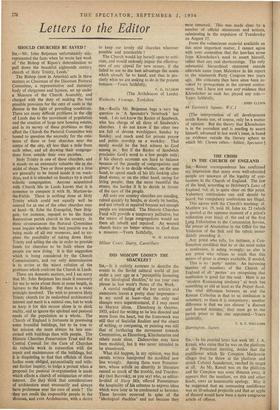DID MOSCOW LOOSEN THE SHACKLES ?
$115, —Is it entirely accurate to describe the events in the Soviet cultural world of just under a year ago as a 'perceptible loosening of the ideological shackles,' to use your own phrase in last week's Notes of the Week.
A careful reading of the key articles and statements leaves a pretty. clear impression— in my mind at least—that the only real changes were superstructural, if I may resort to Marxist idiom. Ehrenburg in October, 1953, asked for writing to be less directed and more from the heart, but the framework was still that of Socialist Realism and the object of writing, or composing, or painting was still that of furthering the movement towards Communism, as Ehrenburg, Khachaturian and others made clear. Zhdanovism may have been modified, but it was never intended to be abandoned.
What did happen, in my opinion, was that certain writers interpreted the modified new line wrongly. Among these were Pomeran- tsev, whose article on sincerity in literature caused so much of the trouble, and Tvardov- sky (not Barovsky, as you ray) who, as editor- in-chief of Novy Mir, offered Pomerantsev the hospitality of his columns to express ideas which were later to be condemned as heresies. These heresies occurred in spite of the ' ideological shackles' and not because they were removed. This was made clear by a number of official statements and actions, culminating in the expulsion of Tvardovsky on August 17.
From the voluminous material available on this most important matter, I cannot agree with your contention that the hoo-haa arose from Khrushchev's need to assert himself, rather than any real shortcomings. The only substantial hierarchical statement outside editorials came from Malenkov in his report to the nineteenth Party Congress two years ago. His criticisms then have since been in- voked by protagonists in the current contro- versy, but I have not seen any' evidence that Khrushchev as such has played any role.— Yours faithfully, 44 Tavistock Square. W.C.1
JOHN CLEWS
• [The interpretation of all developments inside Russia can, of course, only be a matter of opinion. But the theory that Khrushchev is in the ascendant and is needing to assert himself, advanced in last week's issue, is based on evidence outside the literary sphere to which Mr. Clewes refers.—Editor, Spectator.]


































 Previous page
Previous page